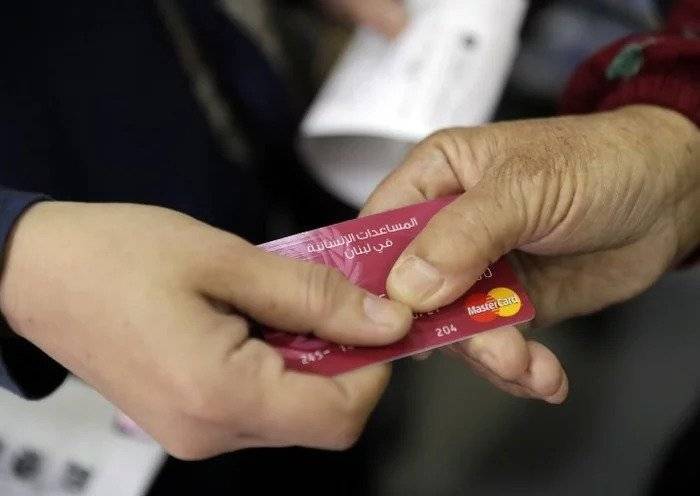
The new aid program will give recipients electronic payment cards, similar to the ones the World Food Program has already been using. (Credit: Joseph Eid/AFP)
BEIRUT – Lebanon’s most vulnerable residents may be on track to receive much-needed international aid in U.S. dollars rather than in the collapsing national currency, after three international donor agencies sent a letter to the Finance Ministry pushing for implementation of a preliminary agreement that had been reached to pay out assistance in hard currency.
In a letter sent on March 15, which was obtained by L’Orient Today, representatives of the European Union, United Nations and the World Bank said “we take note of the verbal agreement” reached with caretaker Finance Minister Ghazi Wazni and the central bank Gov. Riad Salameh “to facilitate the disbursement of humanitarian and development assistance in hard currency as long as the current suboptimal situation of multiple exchange rates persists and for the countries who want to do so.” This followed a Feb. 22 meeting with caretaker Deputy Prime Minister Zeina Akar and Salameh.
“We are confident you share the urgency of rolling out the agreed upon disbursement mechanisms at the earliest, in order to ensure the consistency and continuity of aid amidst increasingly challenging socio-economic conditions,” the letter said. It noted that in cases in which paying out in foreign currency was not feasible, a hybrid system could be put in place to pay out in local currency at the market rate.
The increased pressure by donors to pay out in dollars comes after the Lebanese lira dropped as low as LL15,300 to the dollar on the parallel market yesterday, losing more than 90 percent of its value since the second half of 2019.
The issue of the exchange rate in relation to international aid had become a matter of public debate amid discussions of a $246 million World Bank loan, the majority of which will go to paying out cash assistance to needy Lebanese families.
Under the loan terms approved by the World Bank’s board and by Lebanon’s Parliament, while the funding would come in dollars, the dollars would remain at Banque du Liban, with the aid ultimately being paid out in lira at a rate of LL6,240, meaning that a substantial portion of the market value of the aid would be captured by the financial system rather than going to beneficiaries.
Since the collapse of Lebanon’s currency and financial system began in 2019, spawning multiple exchange rates, other international aid programs that bring hundreds of millions of dollars a year to the country have lost a far larger percentage of the value of their incoming dollars.
For instance, cash assistance programs for refugees run by the United Nation had been paying out in lira at a rate of LL3,900. With the LL6,240 rate having been agreed upon for the World Bank program, the UN agencies pushed to get the same rate. UN refugee agency Country Representative Ayaki Ito said last week that UNHCR’s cash assistance to refugees is now being paid out at LL6,240. However, the amount paid to each beneficiary — currently LL400,000 per month per household — has not increased; instead, the number of recipients was expanded.
While the March 15 letter shows that international donors are stepping up pressure for aid money to be paid out in dollars or at the market rate, the agreement has not been officially accepted by the government and it remains unclear what procedures need to be taken for approval.
““[The letter] is not a guarantee that this will happen. We have to wait and see how they will react to it,” a source with knowledge of the negotiations and the letter told L’Orient Today.
“It’s been under negotiation with the government for so long and it’s not reaching any results,” the source said, adding that while the letter is a request from international donors to revise the payout system, “it’s up to [the government] to actually do it. There is no threat to stop the funding at this point if this does not happen.”
A Finance Ministry spokesperson could not be reached for comment.
Saroj Kumar Jha, the World Bank’s director for the Middle East confirmed to L'Orient Today that the Bank had sent the letter on behalf of donors and that it has “been our position from the beginning” that recipients should be paid in dollars. Jha added that the "agreement approved by the bank board provides flexibility,” when asked whether the currency paid out under the social safety net program could be changed, since the agreement approved by the Bank board and Parliament specified payout in Lebanese lira.
It was unclear whether Parliament would need to approve a change on the government’s side.
Parliament approved the $246 million loan from the World Bank on Friday.
Under the program, more than 160,000 households will receive monthly payments of LL200,000, plus LL100,000 for each family member, for one year on prepaid cards.
With more than half of all Lebanese estimated to be living under the poverty line, the direct payments would provide a necessary social safety net for the country’s poorest.
Additional reporting was contributed by Omar Tamo.